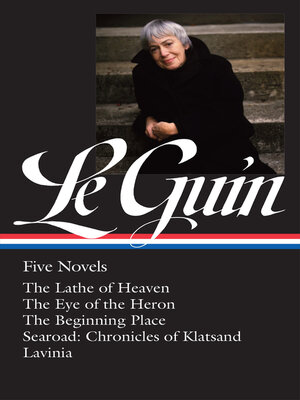Ursula K. Le Guin
ebook ∣ The Lathe of Heaven / The Eye of the Heron / The Beginning Place / Searoad / Lavinia
By Ursula K. Le Guin

Sign up to save your library
With an OverDrive account, you can save your favorite libraries for at-a-glance information about availability. Find out more about OverDrive accounts.
Find this title in Libby, the library reading app by OverDrive.



Search for a digital library with this title
Title found at these libraries:
| Library Name | Distance |
|---|---|
| Loading... |
Together for the first time, all 5 standalone novels from the Hugo and Nebula award–winning writer who reinvented science fiction, including one restored to print
Spans from the 1971 classic The Lathe of Heaven to her career-crowning 2008 masterpiece Lavinia
This 7th volume in the definitive Library of America edition of Ursula K. Le Guin’s works presents 5 remarkable standalone novels that showcase her boundless creativity and literary range.
In the Locus Award–winning The Lathe of Heaven (1971), one of Le Guin’s most admired works of science fiction, George Orr begins have effective dreams: dreams that change reality itself. But when he turns to the sleep researcher William Haber for help, the doctor sees an opportunity to use Orr’s strange gift for his own ends.
A former Terran prison colony on the planet Victoria seems destined for revolution in The Eye of the Heron (1978), when the authoritarian leaders in the City try to assert control over the peaceful farmers who have been sent to live around them.
The Beginning Place (1980) is a parable-like story in which Hugh and Irena have both found their way to the Beginning Place, a gateway to another world. The two initially become enemies, but must learn to work together when the utopia they’ve found turns out to have a shadow.
The long out-of-print Searoad: Chronicles of Klatsand (1991) is a Winesburg, Ohio-like series of linked stories set in a small vacation town on the Oregon coast, where some of the characters have come for a weekend and some for longer, but all are pilgrims in the grip of inexpressible longings.
And Le Guin’s final, powerfully feminist novel, Lavinia (2008), reimagines Virgil's Aeneid from the perspective of a woman who, in poet's telling, never speaks a word.
Special features include an appendix presenting three essays by Le Guin related to the novels, previously unseen hand-drawn maps by author herself, helpful annotation, and a chronology of Le Guin's life and career.
Brought together here for the first time, these 5 remarkable standalone novels showcase a Hugo and Nebula Award–winning master at her very best.
Spans from the 1971 classic The Lathe of Heaven to her career-crowning 2008 masterpiece Lavinia
This 7th volume in the definitive Library of America edition of Ursula K. Le Guin’s works presents 5 remarkable standalone novels that showcase her boundless creativity and literary range.
In the Locus Award–winning The Lathe of Heaven (1971), one of Le Guin’s most admired works of science fiction, George Orr begins have effective dreams: dreams that change reality itself. But when he turns to the sleep researcher William Haber for help, the doctor sees an opportunity to use Orr’s strange gift for his own ends.
A former Terran prison colony on the planet Victoria seems destined for revolution in The Eye of the Heron (1978), when the authoritarian leaders in the City try to assert control over the peaceful farmers who have been sent to live around them.
The Beginning Place (1980) is a parable-like story in which Hugh and Irena have both found their way to the Beginning Place, a gateway to another world. The two initially become enemies, but must learn to work together when the utopia they’ve found turns out to have a shadow.
The long out-of-print Searoad: Chronicles of Klatsand (1991) is a Winesburg, Ohio-like series of linked stories set in a small vacation town on the Oregon coast, where some of the characters have come for a weekend and some for longer, but all are pilgrims in the grip of inexpressible longings.
And Le Guin’s final, powerfully feminist novel, Lavinia (2008), reimagines Virgil's Aeneid from the perspective of a woman who, in poet's telling, never speaks a word.
Special features include an appendix presenting three essays by Le Guin related to the novels, previously unseen hand-drawn maps by author herself, helpful annotation, and a chronology of Le Guin's life and career.
Brought together here for the first time, these 5 remarkable standalone novels showcase a Hugo and Nebula Award–winning master at her very best.







